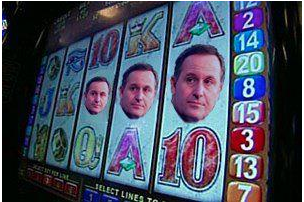Unite Union was set to sit down with SkyCity several weeks ago to start bargaining for a new Collective Agreement.
The company seemed to be deliberately delaying the start of negotiations and then the lockdown has intervened to delay things further.
However, the company used the delay to bring forward a pay offer to staff on an individual employment agreement of up to 15%.
I’d like to think that my open letter to the SkyCity board chairman Rob Cambell in The Daily Blog a few months ago was what caused this unusual behaviour by the company. But the truth is, powerful market forces are at play that the company cannot resist.
I remember Rob from when he was a left-wing economist working for the trade union movement in the 1970s before he swapped sides and become a professional director. In recent months he has been making speeches about how business people need to take more social responsibility and take better care of the workers they employ.
This seemed to be in contradiction to the rapacious conduct of SkyCity with the Covid-associated crisis when they laid off 800 workers in March and ripped up employment agreements to make rostering even more “flexible”. The new rosters for many staff are a direct threat to their health and safety. I politely tried to point out the contradiction between his words and the company’s actions as part of my own bargaining strategy.
I also pointed out that “the market” was telling SkyCity they had overdone the layoffs because with the fast recovery following the lockdowns in March and April the company found itself short of staff and unable to recruit or retain new staff they had recruited.
The $20.10 start rate for many jobs in a 24-7 business just couldn’t compete when other major employers had become “living wage” employers with a start rate that is $22.75 friom from September 1.
The company simply had no choice but to meet those rates if they wanted staff so the offer to staff on individual agreements took the start rate to $23 an hour – just above the new living wage rate.
I also pointed out that the minimum wage had increased in real terms over the last few decades which had compressed margins for skill and service. I compared the margins above the minimum wage when we first negotiated an agreement at SkyCity in 2008 (when the minimum wage was $12 an hour and 50% of the average wage) to now when the minimum wage is $20 an hour and 58% of the average wage. Most margins for skill had been halved even though everyone got an above-inflation pay rise each year over that period.
Unite wasn’t able to maintain margins in part because we are a minority union at SkyCity and lack the bargaining power of a 100% union monopoly.
One of the reasons for this was the fact that SkyCity and other employers have been able over the last two decades to recruit a steady supply of migrant labour that was used by employers to dampen down wage demands. The number of temporary work visas being issued each year went from 40,000 a year in the year 2000 to 250,000 a year in 2020 before Covid.
We should not blame the migrant workers for this situation. The bosses and their governments deliberately expanded these temporary visa categories to have a workforce that was unwilling to assert its rights. This is because these workers were legally dependent on their employer for their visas and needed continued sponsorship to ever achieve the dream of permanent residency. But the permanent residency number was kept the same since 2000 at around 40,000 a year and was barely enough to cover the New Zealanders leaving on a permanent basis.
So when Covid hit there were some 300,000 workers in New Zealand on a temporary visa of one sort or another. Many of these had been here a decade or more renewing their visas again and again. Thousands of children have been born here of these workers who are not allowed to become citizens even though it is the only life they know.
This would not be a problem for anyone if they were able to change jobs and had a genuine pathway to residency. Instead, they were deliberately kept in a vulnerable, easily exploitable position so could be used to suppress wages. That was true in the fast-food industry where managers were recruited from migrant communities and over time their real wages have been cut by 50%.
Capitalism is a system of competition that rewards the most profitable companies. The most profitable companies are often those who can exploit labour the most effectively. Often that labour will be exploited in China or India or wherever labour is cheap and under control, but labour will also be imported to wealthy countries (with fewer rights) for the same purpose. A blind eye is often kept to illegal migration for the same reason. Almost no employer in New Zealand has ever been prosecuted for employing people without a proper visa, for example.
Capitalism is also a system of relentless growth. That means more and more workers (Maori after World War 2, married women, Pacific Islanders) have been drawn into the labour market over time. But New Zealand has a richer neighbour with a stronger labour movement that has managed to protect wages and conditions more effectively. This means New Zealand loses tens of thousands of workers each year to Australia. Most never return.
Before the late 1980s, New Zealand also had a tight labour market with little unemployment. At times we had zero unemployment with no one collecting a benefit. We also had strong unions that could protect workers better on the job and take advantage of the low unemployment to push up real wages. I could get a job at the meatworks for example when I was just 15 and get an adult wage and pay for a flat in the city with some classmates from school. This was good money and we had a union to protect us from bullying or harassment by managers.
People like me would queue outside the meatworks each season when there was officially no unemployment and benefits were much higher as a percentage of the average wage than they are now. If you went back the next season the union ensured you had seniority and would be re-employed before any new person was taken on. After a few seasons, you have pretty much a full-time job and if you needed to could go on the dole in the off-season without being bullied and harassed by the WINZ equivalent at the time..
Unions try to modify the market by trying to establish as close to a monopoly in representation as they can when bargaining. Before the anti-union laws in the 1990s, there was a virtual monopoly in most industrial sectors. In the 1980s in particular, workers were able to use that power to push up real wages and improve conditions over time if they fought hard enough. Drivers for example had good wages, overtime after 8 hours and on weekends, and no split shifts. And the Drivers Union was a powerful force that set the standard for all wage increases in bargaining each year. Nearly every worker belonged to the union.
Professionals like doctors, lawyers and accountants also have corporate bodies that are able to protect and enhance their monopoly powers to impose as high a price as they can for their “labour”. Effectively they are able to extract a monopoly rent that is far above the value of the actual labour performed.
A combination of a deep economic recession driving official unemployment up to 10% in the early 1990s and anti-union laws passed at the same time destroyed the bargaining monopolies of most working people in the private sector. Real wages were driven down by a quarter and casualisation, zero-hour contracts and part-time work replaced the expectation or right of many to full-time employment.
With 10 percent unemployment (20-30% for Māori and Pacifica) no one was going to put their hands up and say they wanted to join a union and fight the boss. This was part of a deliberate strategy at the time. Ruth Richardson’s “Mother of All Budgets” in 1991 that cut benefits and slashed welfare spending also had a recessionary impact that drove the economy down. Unions went from covering a majority of private sector workers to just 10% today.
To right-wing economists providing the theory to justify these actions, the expectation was that when the price of labour was lowered the employers would rush in and hire more workers and an economic boom would follow. These theorists also opposed the existence of the minimum wage – like the Act Party still does today. But the National Party could not go that far so they essentially froze the minimum wage for the next nine years allowing it to drop from about 50% to 30% of the average wage. An abundance of cheap and docile labour meant there was also no real incentive to invest in new technologies. The economic boom never came and New Zealand’s growth rate fell behind Australia even more as a consequence.
When normal economic growth resumed in the mid-1990s and unemployment dropped to around 5% which was considered “normal” for a capitalist economy, the free-market ideologues who still dominated the state institutions and university economics departments started warning that unemployment going below 5% would force up inflation because workers would get too much bargaining power and force up wage rates. This rate even had its own acronym – NAIRU. Check it out on Investopedia:
“The non-accelerating inflation rate of unemployment (NAIRU) is the specific level of unemployment that is evident in an economy that does not cause inflation to increase. In other words, if unemployment is at the NAIRU level, inflation is constant. NAIRU often represents the equilibrium between the state of the economy and the labor market.”
This theory is of course complete and utter nonsense. It is simply a justification to keep the working class weak and exploitable. It has no relationship to when inflation happens because inflation is a monetary phenomenon. But many economists on the left who adhere to the theories of John Maynard Keynes had no real answer because Keynes was a cost-plus theorist when it came to understanding inflation.
This is also in part why the Labour and National Governments obsessively ran budget surpluses despite the fact that this inevitably meant unemployment remained higher than it otherwise would have been because the government is deliberately contracting the economy not expanding it.
But it wasn’t until after the 2008 Great Recession swept the world that the New Zealand governments accepted it could have a lower unemployment rate than 5% without causing inflation and NAIRU was effectively abandoned. The price of NAIRU in the tens of thousands of people deliberately kept unemployed is never acknowledged. For some working families a generation of people were excluded from employment as the bosses did not need to dig deeper into the pool of unemployed and hire people that may have required a bit more money and a bit more time and effort to train.
But today, we have the monetary causes of inflation being implemented to save capitalism again. Printing money on a vast scale and giving it to the 1% in society to settle their debts between each other will save the system temporarily from collapse. But as soon as the economy recovers sufficiently the inflation bogey will be back and workers fighting for wage rises to protect themselves against that bogey will be blamed again.
For now. we need to use the power of the market to extract as much as we can from the bosses who employ us. We must do that to restore what was squeezed from us when unemployment was high and the boss had an almost unlimited supply of cheap labour in the form of temporary visa holders.
They will not be coming back in the next few years because of Covid.
The ones who are here should be given full legal rights to stay permanently if they want and have the right to change jobs.
Any new workers imported in the future should also have that right and then no one can take advantage of their vulnerable situation because they won’t be vulnerable and dependent on particular employers.
And we need to rebuild unions to have the power they need to impose good wages and healthy and safe working conditions on the job.
We need to get rid of casualisation and part-time norms in the private sector. Everyone should have the right to full-time permanent work if they want it.
All the fast-food companies in New Zealand in the 1980s were based on full-time jobs, with overtime for night work and weekends. Why can’t those standards be reimposed today?






Good to see pay rates slowly rising in NZ. Same is happening in the US and UK rhttps://www.bbc.com/news/business-45717768.
Globalism has created a system that floods the world with cheaper workers, the quantitive easing of labour.
Due to various factors in the last few years, when the quantitive easing of labour is disrupted, it is the only time, wages are now able to rise in the west, especially if the labour is low skilled.
If wages can’t rise for low paid workers than poverty abounds. Wage rises are a good thing in the west.
Great article, linking the strands of history to what is happening at Skycity. I knew Mr Campbell in the 70s and early 80s too via the “Distribution Unions” as they were known, and he was certainly a charismatic guy. But after major health problems he reassessed and became an opportunist of the corporate world.
Union density is the key to organising any private sector workplace or industry, but the underlying conditions such as availability of compliant migrant workers are a major too.
A fighting, class left central labour organisation would assist in all these struggles. The formation of the NZCTU was one of the most significant class errors of the late 20th Century imo.
20 dollars an hour x 8 = $160
$160 x 5 days = $800
$800 x 52 weeks = $41600
$41600 x 40 years = $1,664,000 before tax deductions.
This year alone, an investor in Auckland with 10 properties made approx $4 million in tax free capital gains for doing absolutely fuck all, purely because the government rigged the game.
Lets face it, FUCK WORK, Jacinda, Robbo and Orr have proven its pointless. Time to make money other ways. The whole system is broken and crime is going to grow exponentially. Any crime we do will not ever be as large as the crime they committed by destroying our futures anyhow. Betrayal is never forgotten darlings!!!!
So does that mean, for once. Union members can ‘coat-tail’ the individual contract agreement this time?
In our organization, non-union members get all the benefits that the union representatives are able to negotiate on behalf of their members.
I worked with a guy who was a sponsored worker and I couldn’t believe it when he explained his position – effectively indentured to one company without the ultimate legal right to quit find another job if he wanted.
Shocking when you think it through.
I think some employers are disappointed that slavery was abolished.
You mean ‘most’ surely?
Comments are closed.